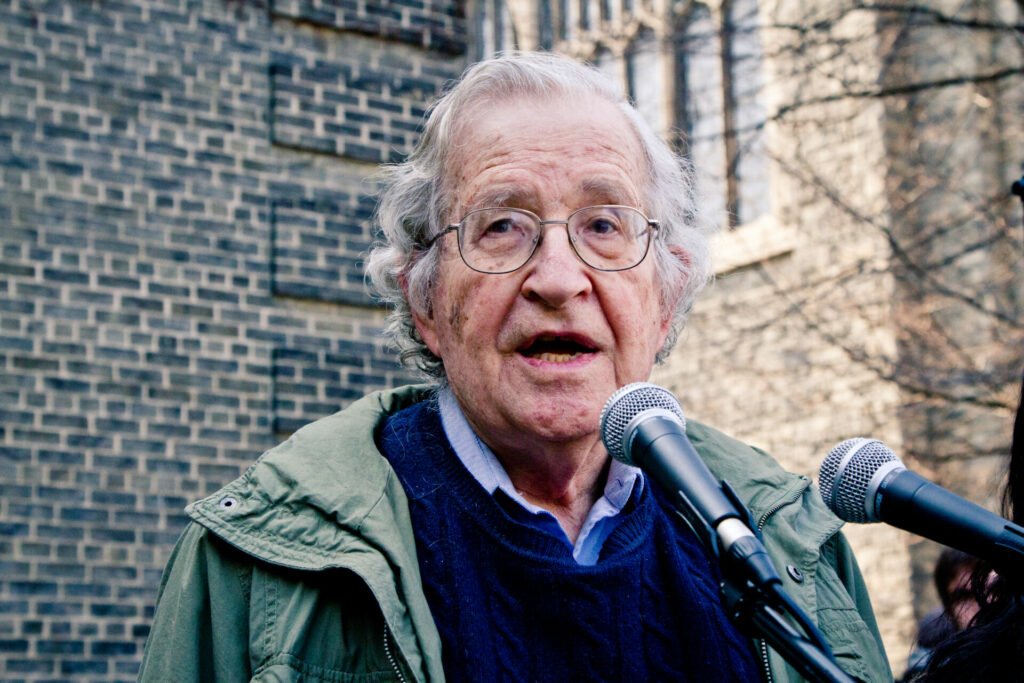On 20 January 2022, the Bulletin of the Atomic Scientists set their infamous Doomsday Clock at 100 seconds to midnight for the third year running. Their accompanying report — entitled 'At Doom's Doorstep' — identified three key factors which brought humanity "the closest it has ever been to civilisation-ending apocalypse".
Two of these factors are unlikely to surprise many readers: namely, climate change and the growing threat of nuclear war. The third might be a little surprising: "a corrupted information ecosphere that undermines rational decision-making". Though some media outlets do deal with the concentration of media influence, this is rarely seen as an existential threat.
In a recent interview with The Brussels Times, world-renowned public intellectual and dissident Noam Chomsky offered a resounding endorsement of the Bulletin's analysis and his own insight on the state of global geopolitics.
"If we don't have the possibility of rational discourse of major issues, then nothing else matters, we're finished," Chomsky stated. He noted that in the wake of Russia’s full-scale invasion of Ukraine and the abject failure of COP27 last year, he expected the Doomsday Clock to be moved even closer to midnight when it is reset in a couple of weeks' time.
"Every single one of these issues — climate change, the growing threat of nuclear war, and the degradation of the space for rational discourse — has become worse in the last year."
The failure of journalism
During the interview, Chomsky repeatedly suggested that rather than contributing to public discourse, journalists have significantly undermined the discussion of the major challenges mankind faces.
One notable example cited by Chomsky was the coverage of the sabotage of the Nord Stream gas pipelines in September last year, which Western media overwhelmingly blamed on Russia. This media coverage overlooked the fact that, among other things, US President Joe Biden had explicitly promised in early February to "bring an end" to the pipelines if Russia invaded Ukraine.
"Anyone with a functioning grey cell knows that there is only one country with the motive and the capability to blow up the pipelines," Chomsky noted. "And it's not Russia. There's absolutely no reason whatsoever why Russia would destroy one of their own capital investments. If they want to cut off gas to Europe, they just have to turn a valve. They don't have to blow up their own pipelines."
Chomsky then referred to a Washington Post article published on the day of our interview, which, he noted, was "very clever" insofar as it "claims that Russia is a 'key suspect' but suggests that there’s a little bit of scepticism about whether the Russians are really responsible — thus demonstrating how open-minded they are." Chomsky, a long-standing expert in media manipulation, called the way that elements of inquiry are suppressed "techniques of propaganda that have been honed to a high art."
The professor's point was arguably further corroborated by a New York Times article published five days later, which "raise[d] the question of why, if Russia bombed its own pipelines, it would begin the expensive work of repairing them" — but nevertheless insistently referred to the sabotage as a "wartime mystery".
The dangers of concision
As a long-time media critic and the co-author (with the late Ed Herman) of Manufacturing Consent – one of the classic studies of Western journalism – Chomsky is known to point out shortcomings of the Western press. Yet he did acknowledge that "in many ways, journalists today are better than they were in the 1950s", which he attributed to the "civilising" activism of the 1960s.
Chomsky has for decades called attention to the detrimental demand for concision – something that has been accentuated in an age of character limits and near-endless distractions. As Chomsky puts it, this boils down to a pressure "to be able to say what you want to say between two commercials".
"Concision is a magnificent propaganda technique because it ensures that nothing controversial can be said," Chomsky said. "Anything controversial sounds like Turkish. You simply don't have time to justify it."
The effects of this are now amplified across the media landscape as people become ever less inclined to read books and spend more time on electronic devices that push "short-form" media platforms such as Tik Tok and Twitter.
"Walk around a college campus. Everyone is glued to their phones. There are even some campuses, for example at Duke University, where they have plaques on the sidewalk reading 'Look up!'... In restaurants you might see a couple of teenagers sitting at a table, each having two conversations: with each other and with somebody else on their phone. Discourse has gone. But it was bad enough before."
Hard-wired for destruction?
During the interview, Chomsky cited a number of "pathological" behaviours which vividly illustrate, as he puts it, "humanity's dedication to self-destruction".
Among those mentioned by Chomsky was the plan recently unveiled by ConocoPhillips, a major US fossil fuel company, to refreeze the Alaskan permafrost — thereby trapping huge amounts of carbon — purely so that the ground can sustain new oil drilling projects. Likewise, he looked to Israel and Lebanon's recent agreement to share offshore gas fields in the Mediterranean — despite the fact that both countries are severely threatened by rising sea levels caused by fossil fuel emissions.
In his 2003 bestseller Hegemony or Survival, Chomsky dealt with similar issues at length. In our conversation, the professor expounded on these ideas, revealing a little-appreciated point about the book's overall structure: "The book begins with the major biologist Ernst Mayr's discussion of the possibility that higher intelligence may be a lethal mutation. The book ends with a quote from British philosopher Bertrand Russell, who, in his discussion of the prospects for world peace, suggested that humanity might be but 'a passing nightmare; in time the Earth will become again incapable of supporting life, and peace will return'. That's the frame of the book."
Smiling, Chomsky appraised that the framing was "perhaps a little too subtle."

